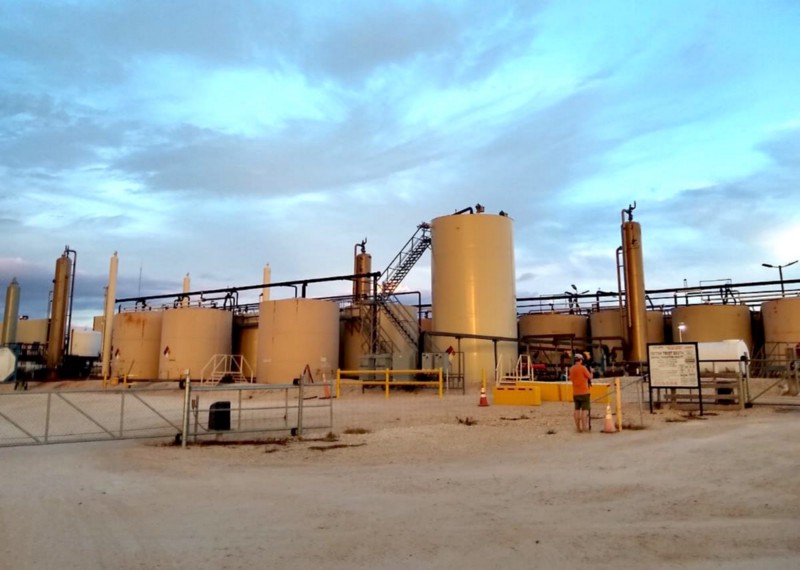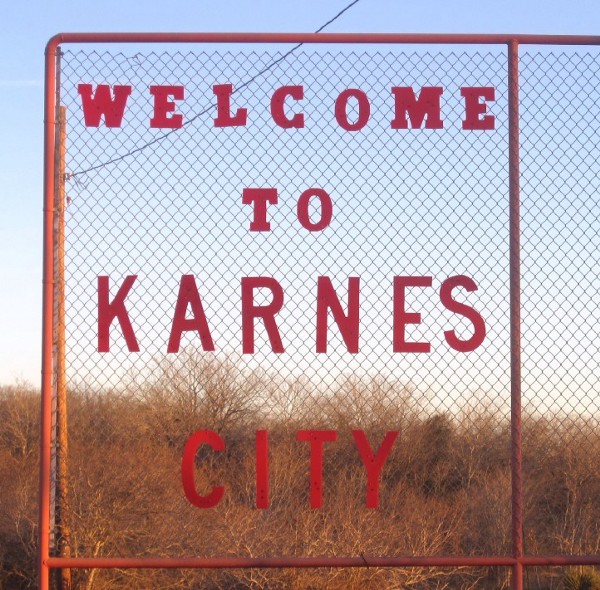Karnes County was once one of the poorest counties in Texas, but a few years ago it saw the beginnings of an oil and gas boom spurred on by advances in hydraulic fracturing, or fracking. Karnes, a county of just 15,000 people, is now home to more than 2,300 active wells churning out a multitude of pollutants believed to cause cancer, brain damage and respiratory problems.
And it’s not the locals who are most at risk.
At the heart of Karnes County lies the Karnes County Residential Center, a privately operated immigrant detention center for families who have come to the United States seeking asylum. The facility is surrounded by gas flares and pumpjack oil wells, some just 100 feet away. Detainees face the same pollution as people living nearby, but unlike residents, they can’t go elsewhere in search of cleaner air.
“The prisoners have no choice but to inhale the toxic fumes coming from these sites,” said Priscilla Villa, an organizer with Earthworks, an environmental group working to stem pollution from coal, oil and gas extraction. “Fracking emissions are harmful to human health and especially hazardous to vulnerable populations, which includes all children, newborns and pregnant women at this detention center.”
A 2017 review of the research on the health impacts of fracking found that expectant mothers and young children are acutely vulnerable. “There is ample evidence that environmental toxicants can cause neurodevelopmental problems,” the authors wrote. “Given the profound sensitivity of the developing brain and central nervous system, it is reasonable to conclude that young children who experience frequent exposure to these pollutants are at particularly high risk for chronic neurological diseases.”

In 2015, mothers went on a hunger strike to protest the quality of the tap water, which they believed to be contaminated by fracking operations. Research has found that chemicals used in hydraulic fracturing can leak into groundwater, threatening the neurological health of those who drink it. Detainees have the option to buy bottled water for $2.50, a high price for those people who have come to the United States with little more than the clothes on their back.
Notably, the detention center has been the subject of numerous claims of mistreatment, including allegations that officers sexually assaulted women and denied medical care to children. In August, 500 fathers and sons being held at the facility went on strike to protest lengthy detentions in “unjust conditions,” saying they had been “treated like animals.”
While the fight for clean air and water inside the detention center is fraught, the situation outside is little better. Texas has no statewide law determining how close an oil or gas site may sit next to a residential property, meaning that, in much of the state — including parts of Karnes County — locals may find themselves living next to a drilling site.
“I affectionately call it Flare City, USA, because, as you can see, there’s nothing but flares all over the place,” said Lucas Hasso, a resident of Karnes County, pointing to oil and gas near his ranch. “We were out here walking and we started gagging. I started getting nauseated.” Hasso said the pollution smelled like “rotten eggs.”

It is difficult to say how much contamination is seeping from drilling sites, as there is only one air monitor in Karnes County and the state relies on self-reporting by oil companies and complaints of residents to track and penalize leaks. Advocates are calling on officials to install more air monitors and instate more rigorous setback laws, though progress is slow.
Despite widespread complaints of wheezing, dizziness, headaches, nosebleeds and heart palpitations, many locals remain committed to the oil and gas business. “Next to football, oil is king in Texas,” said Glenda Baker, who lives near a drilling site in Karnes. “In Texas, you can do with your property what you want.”
Even if advocates manage a full accounting of contamination from oil and gas wells, they are facing an industry that is deeply entrenched, one that employees people across the state and pays landowners hundreds or thousands of dollars each month in royalties. “You’re talking about an industry that’s helping you put food on your table for your family and for yourself,” Villa said. “It makes it really hard for people to organize.”
Jeremy Deaton writes for Nexus Media, a syndicated newswire covering climate, energy, policy, art and culture. You can follow him @deaton_jeremy. Owen Agnew contributed to this report.


